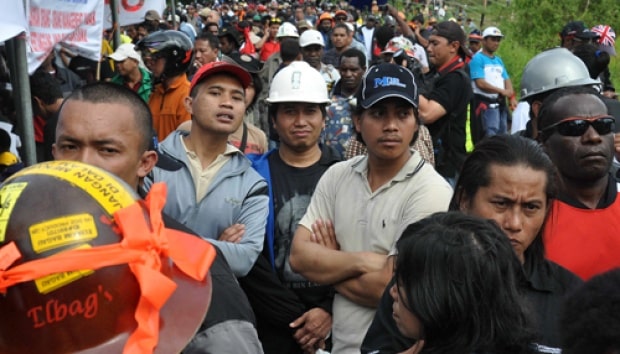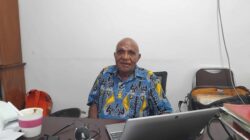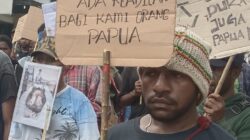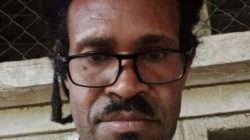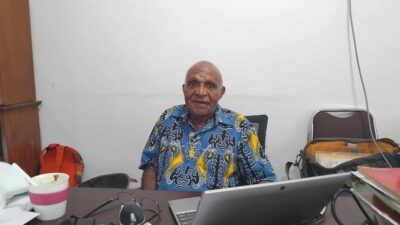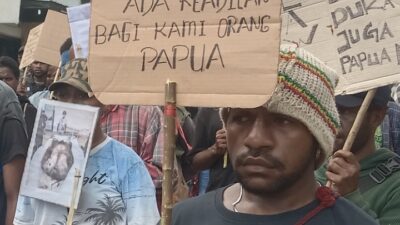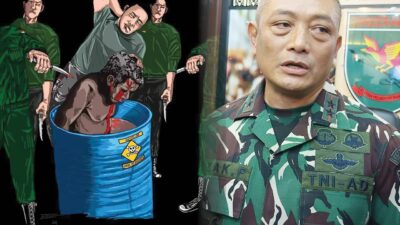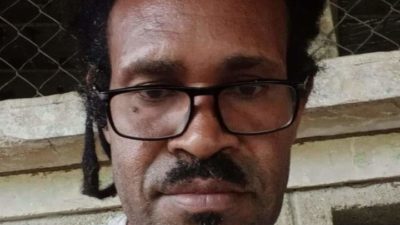Jayapura, Jubi – Indonesian President Joko Widodo or Jokowi is urged to immediately follow up on the recommendations of the National Commission on Human Rights (Komnas HAM) in 2017 and 2018 regarding the rights fulfillment of 8,300 laid-off workers of PT Freeport Indonesia.
Papua Legal Aid Institute (LBH) Director Emanuel Gobay said that the strike of 8,300 Freeport workers was legal based on Manpower Law No. 13/2003 and therefore, they should have not been fired for going on strike.
Gobay said these workers who had been laid off were entitled to wages. He urged Jokowi and the Minister of Manpower to immediately order PT Freeport Indonesia to pay the wages of the laid-off workers.
In 2017, Freeport applied a furlough policy (the placement of an employee on leave without pay), which reaped protests from its workers. Even though the worker union of Freeport had sent letters to the company to reject the policy three times and negotiated, Freeport ignored the union’s request. Therefore, the union notified the company that they went on strike starting May 1, 2017, until there were negotiations with the Mimika Manpower and Transmigration Agency,
“They have sent a notification letter for the strike. The strike itself is a basic right of workers and worker unions, as stipulated in Article 137 paragraph 1 of Manpower Law,” Gobay said in a written statement received by Jubi in Jayapura on Sunday, May 1, 2022.
However, in the midst of the strike, Freeport unilaterally laid 8,300 of them off and terminated their basic salary and health care and social security (BPJS). Whereas according to Article 145 of Manpower Law, workers who strike have the right to receive wages.
In 2017, the union complained to Komnas HAM, who later issued Letter No.:1475/R-PMT/X/2017 regarding the Recommendations on the layoffs of PT Freeport Indonesia, addressed to the President of Indonesia on October 23, 2017.
In 2018 the union again complained to the commission and Komnas HAM issued Letter No.: 178/TUN/XI/2018 on the follow-up actions related to layoffs and BPJS Service Revocation, which was again addressed to the President on November 2, 2018. However, the president did not do anything about it.
In 2018, the Indonesian government through negotiations with PT Freeport McMorand actually produced four points of agreement, namely Freeport to divest 51 percent of the company’s ownership stake for the Indonesian government – of which 10 percent is owned by the Papua Regional Government and Mimika Regency; Second, Freeport must build a smelter in Indonesia within 5 years; Third, the state revenues (central and regional taxes and non-taxes state revenues) must be higher than the contract of the work period and provide investment certainty during the company’s operation; Fourth, the extension of Freeport’s operating period for 2×10 years until 2041 is obtained through the issuance of a special mining permit (IUPK).
According to Gobay, the government’s lack of responsiveness to the Komnas HAM’s recommendation gave the impression that Freeport was not guilty. In fact, Gobay said, the implementation of the furlough policy by Freeport had violated the rights of Freeport workers, robbed them of welfare and education for their children, and even took the lives of 100 workers who fell ill and could not pay treatments at the hospital due to economic problems caused by the layoffs.
Gobay further questioned Jokowi’s commitment to protecting labor rights in accordance with Article 28 paragraph 4 of the 1945 Constitution in conjunction with Article 8 of Human Rights Law No. 39 /1999.
Anton Awom, a former Freeport worker who went on strike and was arbitrarily laid off, said that the government should accommodate the rights of laid-off workers. “We are just victims of policies from the management of PT Freeport Indonesia,” said Awom. He considered the Indonesian government and PT Freeport Indonesia had violated human rights. (*)


